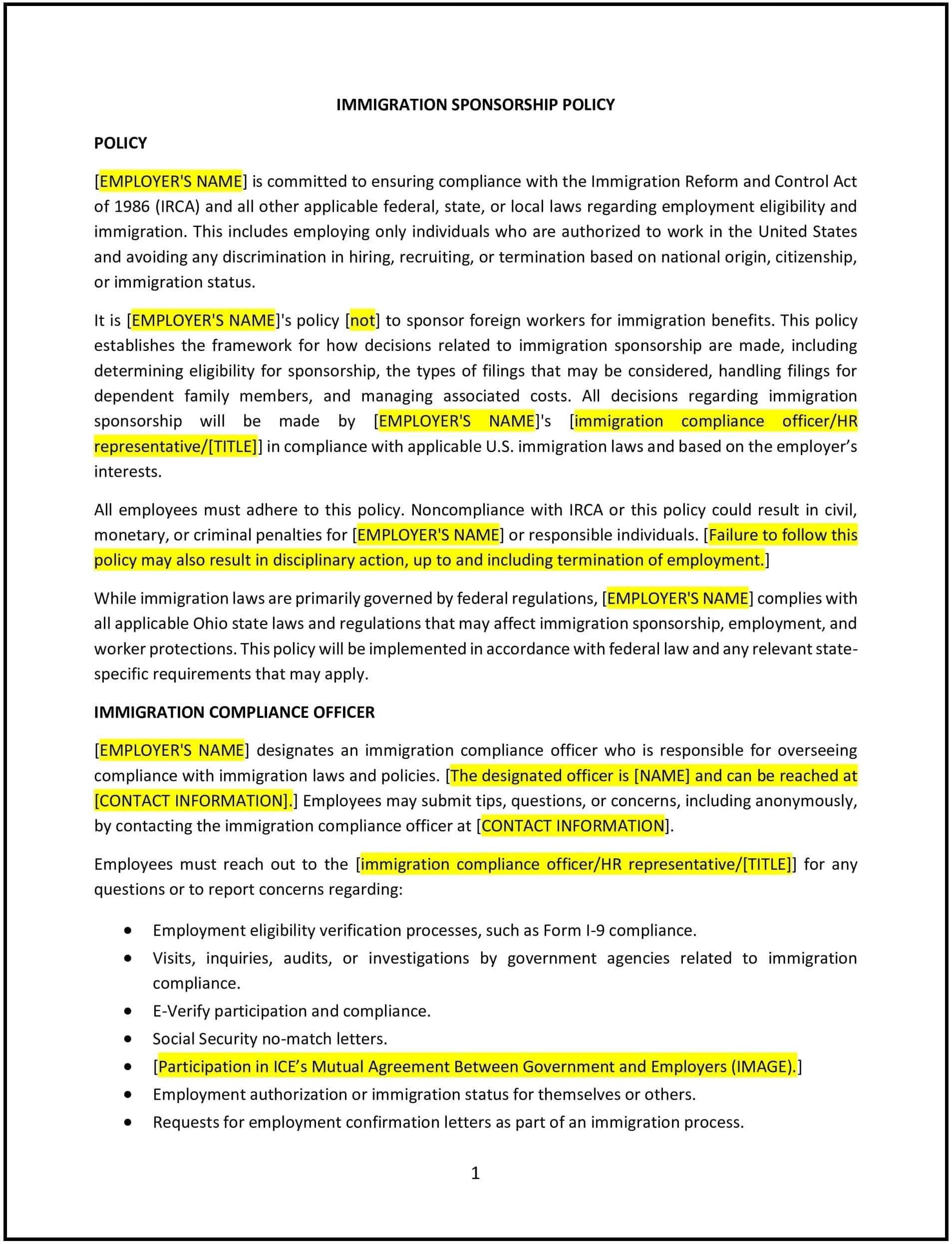Immigration sponsorship policy (Ohio): Free template
Got contracts to review? While you're here for policies, let Cobrief make contract review effortless—start your free review now.

Customize this template for free
Immigration sponsorship policy (Ohio)
An immigration sponsorship policy provides Ohio businesses with guidelines for sponsoring foreign workers to obtain work visas, green cards, or other employment-related immigration statuses. This policy outlines the criteria for sponsoring employees, the process for applying for immigration status, and the responsibilities of both the employee and the business during the sponsorship process. It also clarifies the types of visas or permits available, the duration of sponsorship, and the legal obligations associated with hiring foreign nationals.
By implementing this policy, Ohio businesses can expand their talent pool by hiring qualified foreign workers, comply with immigration laws, and support employees through the immigration process.
How to use this immigration sponsorship policy (Ohio)
- Define eligibility for sponsorship: The policy should specify the criteria under which an employee may be eligible for sponsorship, including their role, skills, and qualifications. It should also clarify any restrictions based on the employee’s immigration history or current work status.
- Outline the types of sponsorship available: The policy should explain the different types of immigration sponsorship available, such as H-1B visas, employment-based green cards, or other work permits, and the specific criteria for each.
- Establish the process for sponsorship: The policy should describe the steps involved in sponsoring an employee, including the documentation required, timelines for submission, and any employer responsibilities throughout the process.
- Address the duration of sponsorship: The policy should specify the length of time the business is willing to sponsor an employee and the process for renewing or extending sponsorship if applicable. It should also outline how the business handles sponsorship termination or changes in immigration status.
- Clarify employee responsibilities: The policy should outline the employee’s role in the sponsorship process, such as providing necessary documents, attending immigration interviews, or keeping the business informed of any changes in their immigration status.
- Provide legal compliance guidelines: The policy should explain that both the business and the employee must comply with all applicable federal and state immigration laws, and that failure to do so could result in penalties, fines, or termination of sponsorship.
- Address costs and fees: The policy should clarify who will bear the costs associated with the sponsorship process, including legal fees, filing fees, and other administrative costs.
- Regularly review and update: The policy should be reviewed regularly to ensure it remains aligned with changes in Ohio state laws, federal immigration laws, and the needs of the business.
Benefits of using this immigration sponsorship policy (Ohio)
This policy provides several key benefits for Ohio businesses:
- Expands the talent pool: By offering sponsorship, businesses can access a broader range of qualified candidates, particularly in industries with skill shortages.
- Promotes diversity: Immigration sponsorship helps diversify the workforce by welcoming skilled workers from different backgrounds and countries.
- Fosters loyalty and retention: Employees who are supported through the sponsorship process are more likely to feel valued and remain loyal to the business.
- Reduces turnover: Sponsoring employees for work visas or green cards can reduce turnover by providing long-term employment stability and a clear path to permanent residency.
- Increases global competitiveness: By hiring foreign talent, businesses can improve their global competitiveness and bring unique perspectives to innovation and problem-solving.
- Helps meet legal requirements: The policy helps ensure that businesses comply with federal and state immigration laws, reducing the risk of legal penalties or issues related to unauthorized employment.
- Enhances business reputation: A business that sponsors foreign workers and complies with immigration laws can build a reputation as a progressive, inclusive employer, attracting top talent from around the world.
Tips for using this immigration sponsorship policy (Ohio)
- Communicate the policy clearly: Ensure that all employees are aware of the immigration sponsorship policy by including it in the employee handbook, discussing it during onboarding, and providing training on the process for managers and HR personnel.
- Work with legal professionals: It is important to consult with immigration attorneys or legal experts to ensure that the business is following all legal requirements and providing the correct support during the sponsorship process.
- Be transparent about costs: Clearly communicate any costs associated with immigration sponsorship, including who is responsible for paying fees and other related expenses.
- Monitor changes in immigration laws: Stay informed about changes in federal and state immigration laws that may impact the sponsorship process. Regularly review the policy to ensure it reflects current legal requirements.
- Provide timely updates to employees: Keep employees informed about the progress of their sponsorship applications, including any delays or changes in the process. This helps maintain transparency and ensures employees feel supported.
- Establish clear timelines: Clearly define the timelines for sponsorship applications, renewals, and extensions, and ensure that all necessary steps are completed on time to avoid delays or issues with work authorization.
- Review and adjust: Periodically review the policy to assess whether it is meeting the needs of the business and employees. Make adjustments as needed to align with changing immigration laws or evolving business goals.